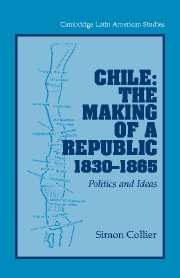Book contents
- Frontmatter
- Contents
- Acknowledgments
- Abbreviations Used in the Notes
- Introduction
- PART I THE NEW REPUBLIC, 1830–1865
- PART II FROM PORTALES TO MONTT, 1835–1851
- PART III MID-CENTURY ATTITUDES
- 5 Progress and Its Instruments
- 6 Political Argument
- 7 Model Republic
- 8 Looking Outward
- PART IV ORDER AND LIBERTY, 1851–1864
- Sources
- Index
7 - Model Republic
Published online by Cambridge University Press: 24 July 2009
- Frontmatter
- Contents
- Acknowledgments
- Abbreviations Used in the Notes
- Introduction
- PART I THE NEW REPUBLIC, 1830–1865
- PART II FROM PORTALES TO MONTT, 1835–1851
- PART III MID-CENTURY ATTITUDES
- 5 Progress and Its Instruments
- 6 Political Argument
- 7 Model Republic
- 8 Looking Outward
- PART IV ORDER AND LIBERTY, 1851–1864
- Sources
- Index
Summary
What can be described as the Chilean worldview (educated Chileans' cosmovisión or imaginario, as Spanish-speakers sometimes call it nowadays) has obvious connections with the ways in which both political ideas and political behavior developed in the mid-century years, not to mention the program of reform espoused by both Conservatives and Liberals. For this reason alone, it needs to be examined as part of the general pattern of ideas and politics. What kind of a country did educated Chileans of the early republic think they were living in? How did they “imagine the nation”? What were their feelings about it? How did they see its future and interpret (or start to interpret) its past? Since they often looked beyond their own frontiers, we need to ask how they saw their country fitting into the postcolonial Latin American pattern. What were their attitudes to the great world beyond South America, especially Europe and the United States? To what extent did they take Europe or the United States as models for their own future? The following two chapters illustrate the multitude of answers Chileans gave to these questions.
The Chilean Superiority Complex
Qué escena tan sublime
Oh Patria ves hoy día!
Una era en agonía
Y otra era que te imprime
Su sello constructor!
What a sublime scene,
Oh homeland, do you see today!
One era of agony
And another era which imprints
Its constructive seal.
- Type
- Chapter
- Information
- Chile: The Making of a Republic, 1830–1865Politics and Ideas, pp. 145 - 166Publisher: Cambridge University PressPrint publication year: 2003



